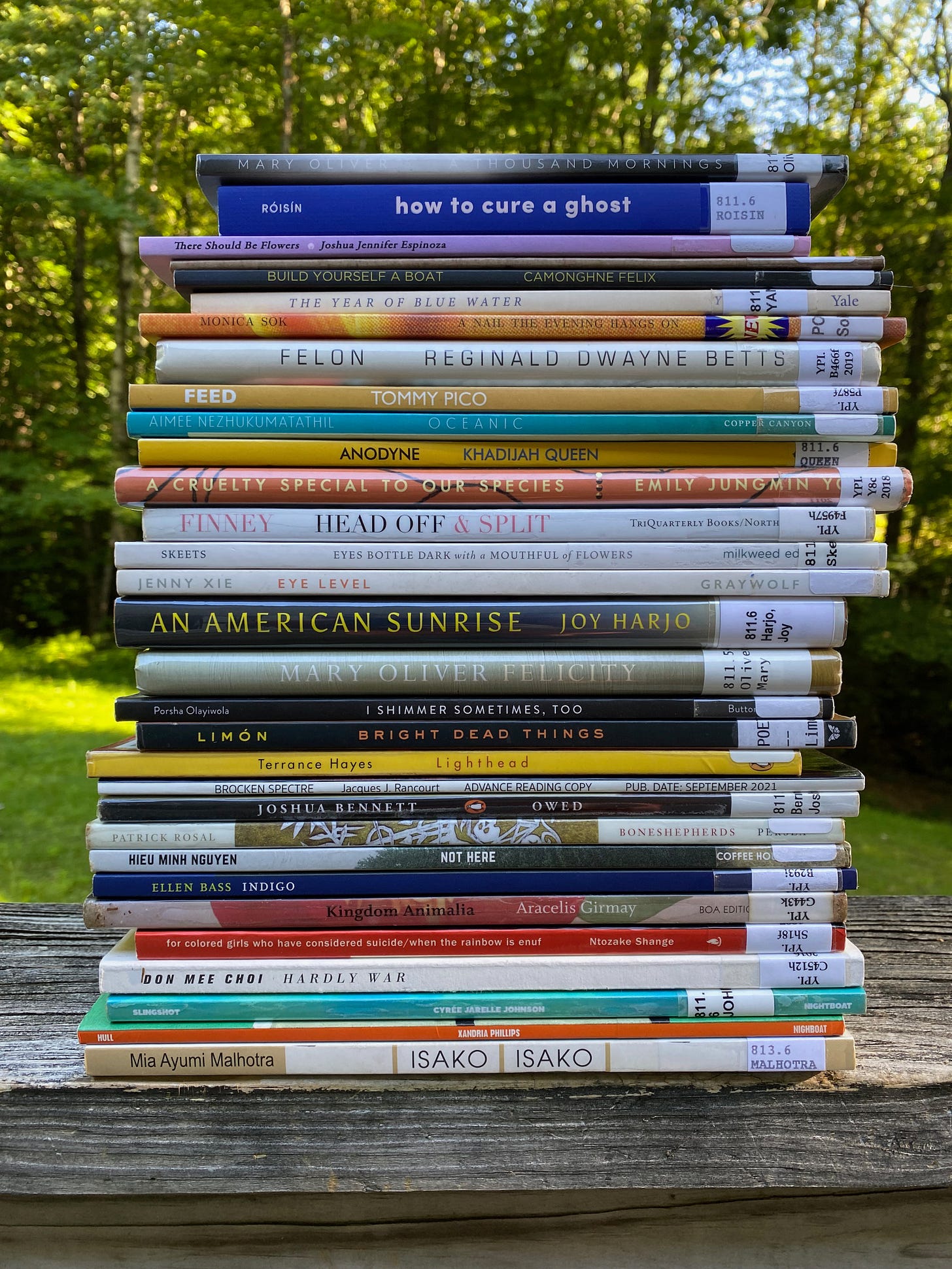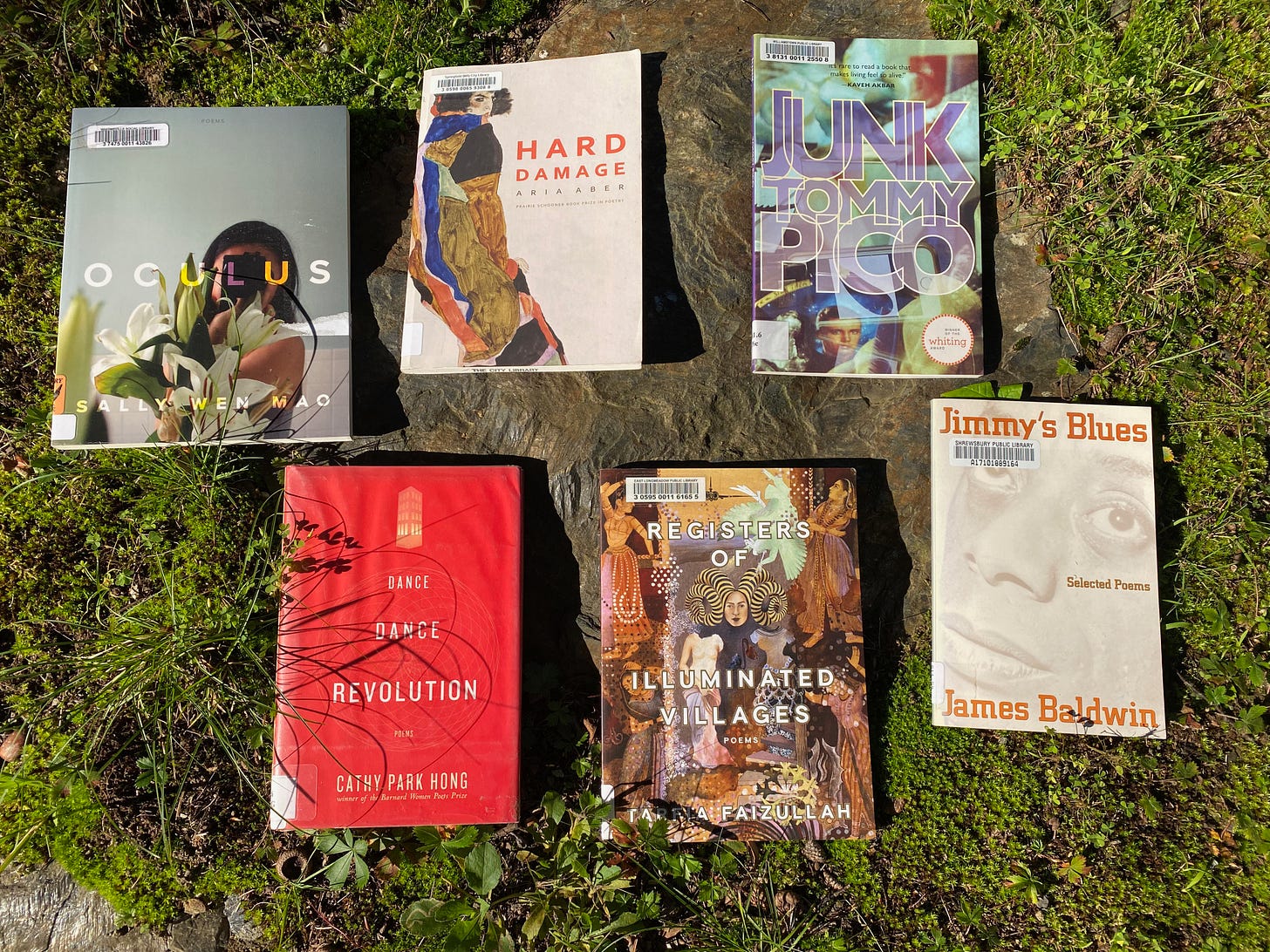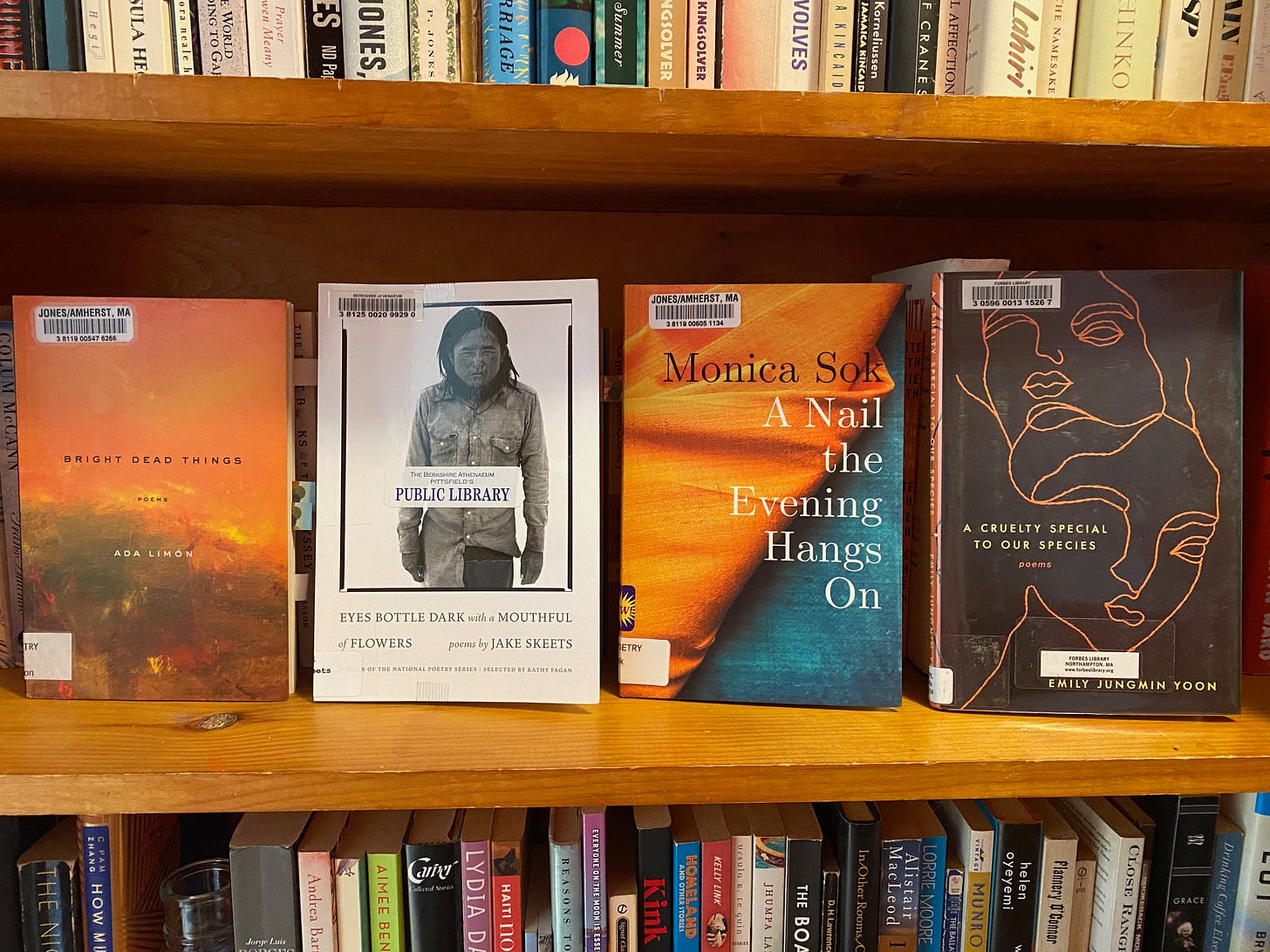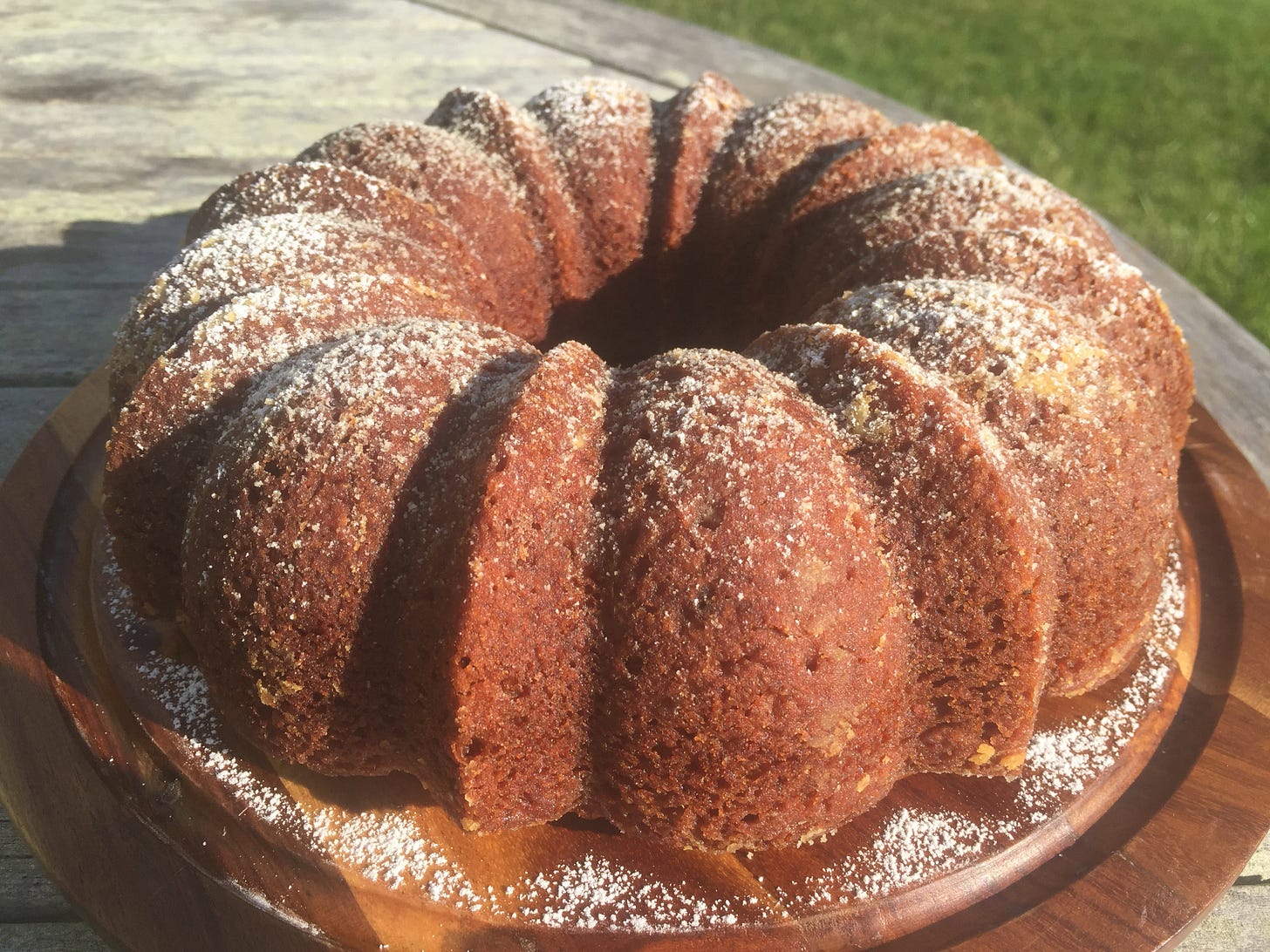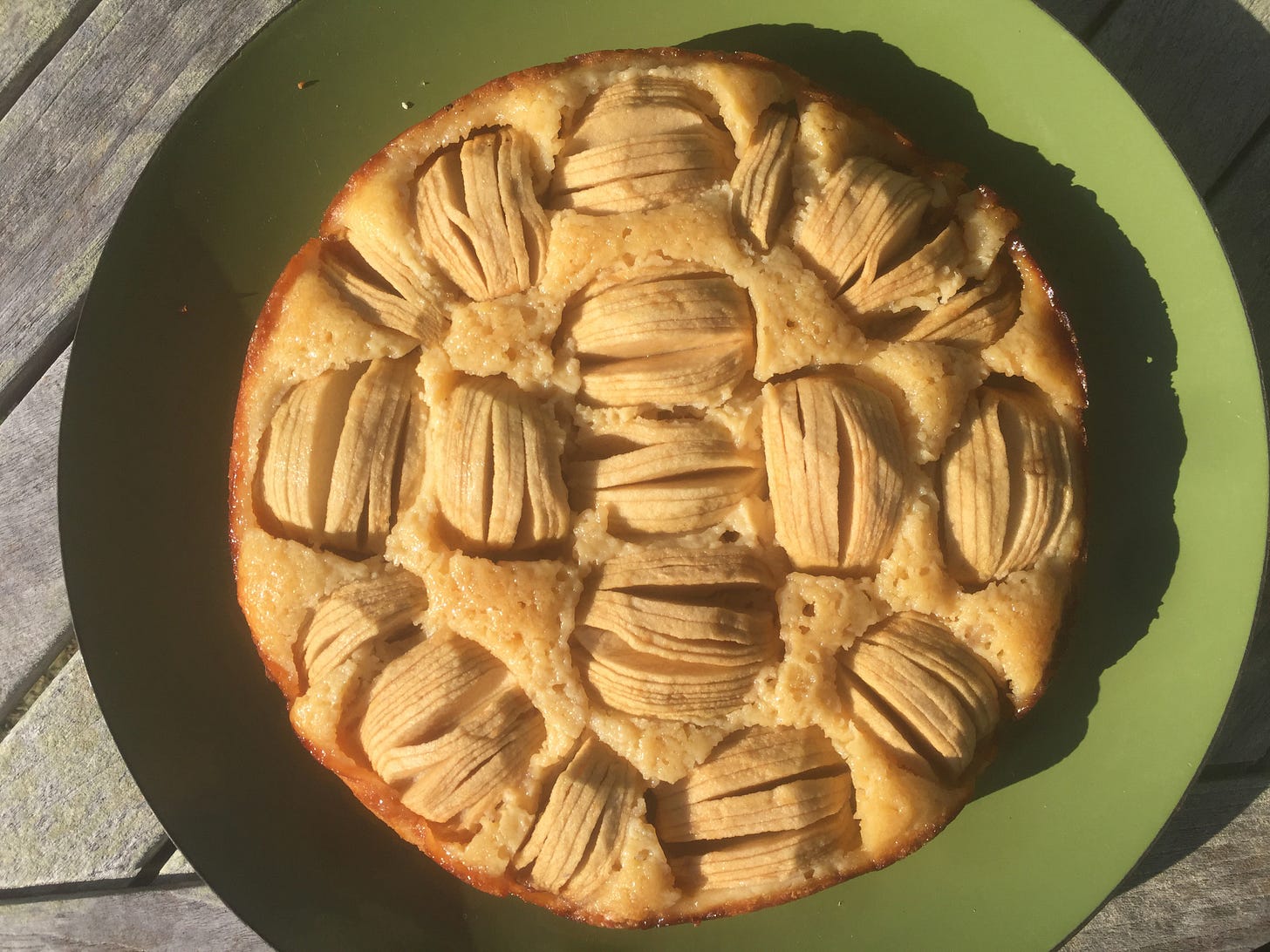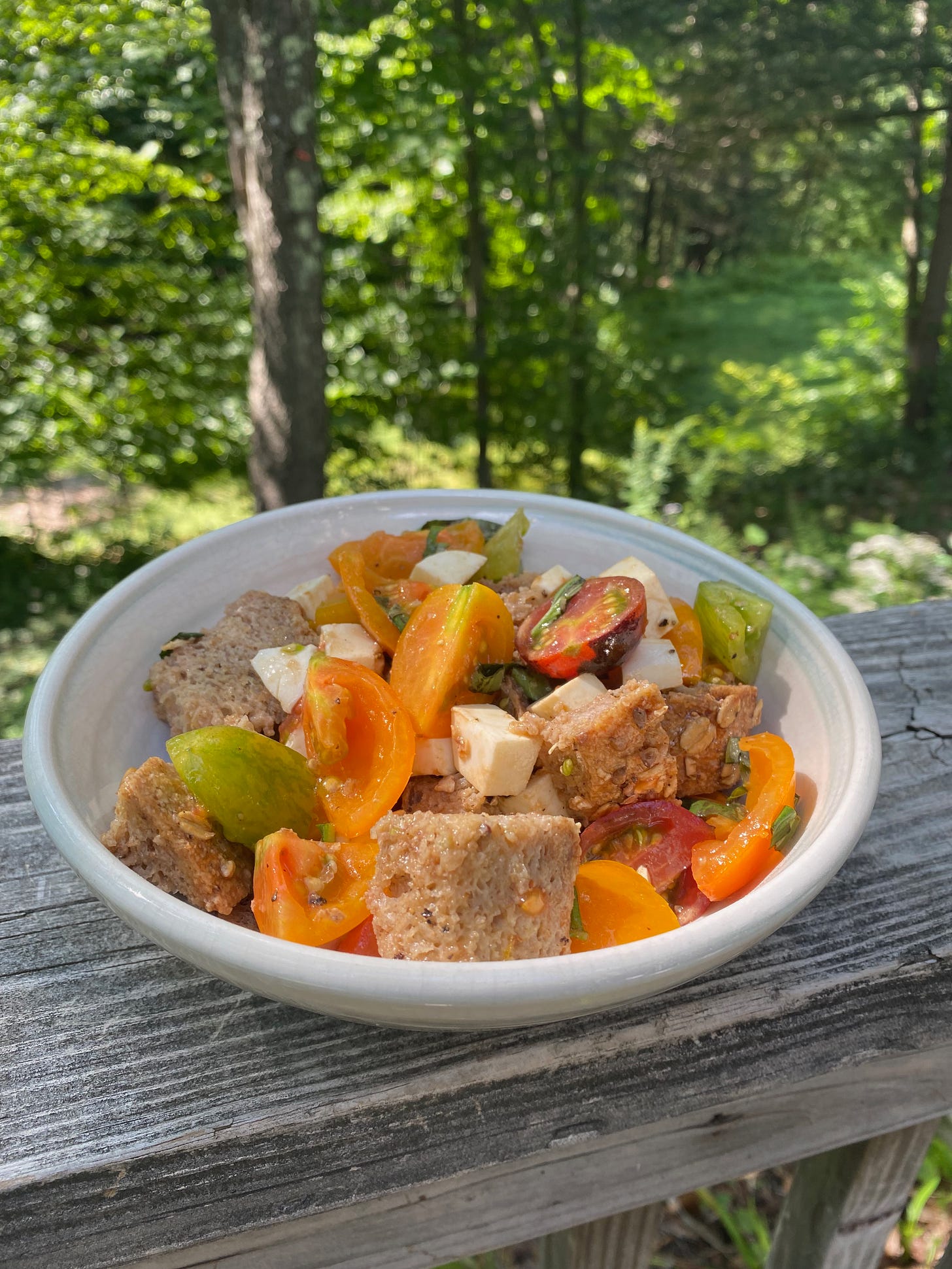Volume 1, No. 25 : 31 Collections of Poetry + Cakes for a Sweet New Year
In which I break all the rules for the third time
Greetings, readers, eaters, and friends! It is September, and I could not be happier, even though August was a great reading month for me. Here’s what it looked like:
Also this:
This, too:
You get the idea. I read a lot of poetry! I participated in The Sealey Challenge, a monthlong reading challenge started in 2017 by poet Nicole Sealey. The idea is simple: during the month of August, participants read one poetry collection or chapbook every day. The idea isn’t necessarily to finish 31 books of poetry, though many people do. It’s about immersing yourself in poetry, discovering new poets, and connecting with other poetry lovers.
My fellow Rioter Connie Pan (who wrote a beautiful piece about last year’s challenge) reminded me of it in late July. I was having a meh reading month. That may sound silly, considering how many books I recommend in this newsletter, but I do go through reading slumps, too—or at least, what feel to me like reading slumps. The Sealey Challenge turned out to be just what I needed. I immediately maxed out my library holds with poetry collections, and as soon as one batch came in, I requested more.
I’ve been reading more and more poetry over the past few years, but I’ve never read so much poetry in a month. Reading one collection a day is a lot, and sometimes I struggled to finish my chosen book. I read a few collections faster than I would have otherwise. But overall, it was an incredible month. I’m newly excited about poetry in a way I haven’t been in a long time.
I started every day in August with poetry and tea. Before looking at my phone or eating breakfast, I’d sit down in the chair by the window with the day’s book and my cup of tea. It’s become a ritual now, this early morning space to sit and read before the world gets loud. It’s the biggest gift the challenge has given me. I won’t be reading a collection every day in September, but my tea and poetry ritual is here to stay.
Instead of a regular newsletter this week, I’m celebrating poetry. Here are the 31 collections I read in August, in brief. I present them to you in the order that I read them. My favorites are marked with an star. It’s a long one, so you’ll likely have to click through to get the whole experience.
Not into poetry? Take this fun quiz I made instead: Design Your Perfect Dinner Party and Get an Under-the-Radar Queer Book Rec.
The Books
*Feed by Tommy Pico
This booklength poem is wild and raunchy and sarcastic and wise and funny. Pico seems to invent his own language, a blend of internet slang and conversational banter and a kind of frenzied poetic rhythm. I especially love the sections where he’s describing dates and hookups and past lovers as planets, in juxtaposition with searching for life in the universe, and ends the descriptions with “next planet”. There’s so much brilliant playfulness in this. You can read some selections from this brilliant book here.
*Oceanic by Aimee Nezhukumatathil
I love joyful poetry, and there is so much joy in this collection. It’s about creatures and plants, mysteries, home. This is one of my favorites from the whole book.
*The Year of Blue Water by Yanyi
This is a beautiful and sparse collection of prose poems that feel linked. The book is a journey, a record of striving and seeking. Yanyi writes about transition and gender and uncertainty. It’s rigorous and playful at the same time. Here’s one of my faovirtes:
Form gives space for something to exist. You have to dig in yourself to find what you’ll put in. Places you don’t know appear. Poems are a way to ask for what exists, to invite what wants to be visible.
Felicity by Mary Oliver
Mary Oliver’s work has been so important to me throughout my life. I picked up a few of her newer collections this month, and they didn’t move me the way her earlier books have.
*Hull by Xandria Phillips
There’s such an explosion of forms in this one—prose poems, white space, the way the words are laid out on the page. It’s about Blackness and queerness, the past and its haunting of the present. Phillips blends boisterous humor with an underlying seriousness. This poem is brilliant.
I am made every day like a bed
like a person makes another
and nothing ever asks to be made.
There Should Be Flowers by Joshua Jennifer Espinoza
My very favorite poems are full of concrete and startling images, and this book is more of a confessional; it’s more idea-and-feeling heavy than image-heavy. But I loved it anyway. Espinoza writes with so much anger, humor, and warmth about trans womanhood. It’s a painfully beautiful collection, with lines like this: “Bookend my body with all your rain / until I grow into something better.”
*A Cruelty Special to Our Species by Emily Jungmin Yoon
A beautiful and brilliant collection about history, memory, language. Many of the poems are about Korean comfort women during WWII and they are haunting.
If a word for religion they don’t believe in is magic,
so be it, let us have magic. Let us have
our own mothers and scarves, our spirits,
our shamans and our sacred books. Let us keep
our stars to ourselves and we shall pray
to no one. Let us eat
what makes us holy.
*Eyes Bottle Dark with a Mo uthful of Flowers by Jake Skeets
This collection is full of sharp and interesting fragmented language. I love how Skeets uses white space. The poems are about violence, addiction, plants, yearning. Many use Navajo words. I love this one.
*Bright Dead Things by Ada Limón
Ada Limón is a new favorite poet. Her work is beautiful and open and full of the physicality of the world: plants, bodies, creatures.
The heart is so tired of beating
herself up, she wants to stop it still,
but also she wants the blood to return,
wants to bring in the thrill and wind of the ride,
the fast pull of life driving underneath her.
*A Nail the Evening Hangs On by Monica Sok
This collection is about the Cambodian genocide and generational trauma. The chorus of voices Sok uses in her poems is so painful and powerful.
*Teaching My Mother How to Give Birth by Warsan Shire
This was my only reread of the whole month! It was just as brilliant as when I first read it 2017.
*Eye Level by Jenny Xie
A collection about movement and migration, belonging, seeking home, cities. There’s a feeling of movement throughout, and the poems jump from place to place—New York, Phnom Penh, Corfu, Hanoi. “Ongoing” and “Long Nights” are two favorites.
*Pardon My Heart by Marcus Jackson
These poems all have similar structures, and I love the surprises each one holds. Jackson writers about contemporary Black life, American violence, the suburbs, and a whole lot more. “Pardon My Heart” is a favorite. I’m awed by Jackson’s language, elegantly simple, always shapeshifting:
If only my voice were swallows
of ripe wine. If only my voice could be
a handsome hand on night’s thigh.
Ordinary Beast by Nicole Sealey
This is such a quietly beautiful book of poems. Sealey takes all the messy workings of the ordinary world and excavates them. “Even the Gods” and “Hysterical Strength” are two favorites. “Medical History” is another stunner.
*Indigo by Ellen Bass
This was such a surprise, because I’d never heard of Ellen Bass and picked this up randomly in the library. She’s a new favorite now. This is a book full of lush and gorgeous poems about parenthood, grief, queerness, marriage, domesticity, aging, illness, chickens. I love this poem so much.
*Maps and Transcripts of the Ordinary World by Kathryn Cowles
This is such an unusual collection, a blend of poems, prose poems, and hybrid photograph poems. It’s about places and what they mean in our lives and whether they’re translatable, the gulfs between written language and the language of ocean, path, rock, bird, love.
Build Yourself A Boat by Camonghne Felix
This is a collection about girlhood, womanhood, trauma, the possibilities of healing. A lot of the poems play with form. There’s a cohesiveness to collection; it’s tied together with a series of footnotes that come together at the end. I love poetry like this—individual pieces that are distinct parts of a whole.
In the Lateness of the World by Carolyn Forché
I didn’t love this collection, but I do love this poem.
An American Sunrise by Joy Harjo
In this collection, Harjo speaks directly to her ancestors. Interspersed with personal poems are a series of poems about the forced removal of the Mvskoke people from their homelands in the 1800s. It’s a powerful book.
*You Don’t Have to Go to Mars for Love by Yona Harvey
These poems play with words and space and form so brilliantly. There are several poems titled “Google Search Keywords” that took my breath away. The titular poem, “You Don’t Have to Go to Mars For Love” uses periods in surprising and starling ways. I’m still thinking about it. “You don’t have to go. to Mars for love. / For you to be willing. is more than enough.”
A Thousand Mornings by Mary Oliver
Once again, I found myself less in love with Oliver’s work that I’ve been in the past. But this lovely poem spoke to me.
*All Heathens by Marianne Chan
A stunning book about immigration and memory, Filipino history, living in diaspora, food and family, the legacies of colonization, language and translation. “Origin Story” and “On Buzz Aldrin’s Birthday” are two of my favorites.
*Owed by Joshua Bennett
This is one of the best collections I read all month. It’s a celebration of Blackness, a beautiful meditation on father-son relationships, full of elegies and odes. Many of the poems are titled “Reparation”, and they are all breathtaking, but this one is my favorite. There are also several “Owed” poems, such as “Owed to the Plastic on Your Grandmother’s Couch” that celebrate, thank, and reflect on various parts of Black culture and life.
Self-Portrait with Cephalopod by Kathryn Smith
A surprisingly optimistic book about climate disaster, apocalypse, the violence humans do to the natural world. Smith blends cynicism and despair with a refreshingly earnest overflowing love for the world, and the combination works for me.
Have you ever wondered
what’s beneath the skin, working? I know
so little, I wouldn’t recognize my own heart if I saw it
outside my body.
Boy with Thorn by Rickey Luarentiis
This collection is a loud and painful blend of past and present. It’s about art and imagination and the South, racial and sexual violence, ghosts.
I want to be released from it,
I want its impulses stunned to lead.
This body. Its breath.
*Dispatch by Cameron Awkward-Rich
This is another favorite of the month; it stunned me. It’s about transness and self-expression and family and living in an impossible world. It’s also about the history of racist violence in the US and the horror inflicted on Black bodies. Awkward-Rich’s language is precise and musical. I can’t stop thinking about this poem.
That Was Now, This Is Then by Vijay Seshadri
I had trouble connecting to this one. It felt very philosophical.
Junk by Tommy Pico
Another book-length poem, this one is a series of couplets about breakups and sex, intimacy and fear, race, desire, history, and, of course, junk. The speaker continually interrupts himself, injecting pop culture references, internet slang, witty asides, and notes to himself into the stream-of-consciousness flow. Tommy Pico is such a unique poet. His work is dazzling and strange, always funny and incredibly sharp.
*Catrachos by Roy G. Guzmán
These poems are about being queer and brown, cultural heritage, family in many iterations, borders, storytelling.
Crazy what intamcy
will forge from colonized hunger: a map forever
extinguishing, taking more than a blitzed glitch
to cover the stratosphere. I almost evolved in cinders.
*The Crown Ain’t Worth Much by Hanif Abdurraqib
Music, childhood, Blackness, marriage, ghosts, music, police violence, music. This collection pulses. Music and all the stories and memories and meanings it holds. The prose poems are remarkable, dense with rhythm.
*Registers of Illuminated Villages by Tarfia Faizullah
A gorgeous collection about place and displacement, grief, sisterhood, agony and delight. “I don’t know why we don’t know our own holiness / but once you were a little girl, and so was I.” “Self-Portrait As Mango” is a favorite.
The Bake
Rosh Hashanah is coming up next week, so instead of including a recipe of my own, or one I’ve tweaked, I’m including a few beloved Rosh Hashanah desserts that I’ve made in years past.
Red Wine & Honey Cake: Friends, it’s miraculous. It’s also an NYT recipe (I’m sorry!) and I haven’t figured out how to share them yet. If you’re not a subscriber and you want this recipe, just hit reply, and I’ll happily copy it into an email!
Apple Sharlotka: This is a tall and delicious apple cake. It’s also super simple. Sunken Apple & Honey Cake (below) is another simple and absolutely stellar Rosh Hashanah dessert.
Wine Poached Pear & Chocolate Tart: Okay, this is my own invention. I make this tart crust, these wine poached pears, and a simple chocolate ganache. Bake the pastry shell, pour in the ganache, let it cool. Slice the pears, pile them on top of the chocolate, and brush with the pear poaching liquid, cooked down into a syrup. It’s possibly my favorite dessert ever.
The Bowl & The Beat
The Bowl: August in a Bowl
Years ago, I started making the classic tomato-basil-mozzarella sandwich as a salad instead. We had it all the time for farm lunch, and it became known as August in a Bowl. It is the easiest and best of summer meals. I know it’s September now, but you can still make this. You can even call it September in a bowl!
Chop up enough crusty bread, tomatoes, fresh mozzarella, and basil to satisfy the people you’re feeding. Dump it all in a bowl. Season liberally with salt and pepper. Drizzle olive oil and balsamic over the top. Mix well. It’s even better if you let it sit a while so all the flavors can mingle. It’s not as delicious after it’s been in the fridge.
The Beat: Two Poetry Collections I’ve Loved on Audio
I can’t say enough good things about listening to poetry on audio. I wish more collections were available in this format! Getting to hear poets read their own work is such a gift. These are two of my all-time favorites.
Life on Mars by Tracy K. Smith: Smith writes about wide-ranging subjects, both vast and intimate: current events, gun violence, David Bowie, the universe and the nature of space, parenthood, race. The poems are exacting and gorgeous, but easy to fall into.
Shame is an Ocean I Swim Across by Mary Lambert: These breathtaking poems are so many things all at once: incendiary, funny, tender, heartbreaking, angry, celebratory. Some of them are exuberant with joy; her love poems are gorgeous. There are also poems about rape and sexual abuse that are harrowing. Lambert uses words in so many different and surprising ways. Her audio performance is equally spectacular. There’s piano music throughout, which at first I found distracting, but came to love. The way she weaves the music into her delivery of the poems makes the whole thing feel seamless, and adds even more layers of meaning.
The Bookshelf
The Library Shelf
I still have 40 poetry collections checked out, so I’m on a self-imposed holds band until I catch up. A few I’m most excited to get to soon: Lightheaed by Terrance Hayes and Anodyne by Khadijah Queen.
The Visual
Just in case you didn’t think there were enough pictures of poetry in this issue, here’s one of my poetry shelves at home. It’s a mix of books I’ve had since high school and recent favorites.
Around the Internet
On Book Riot, I made a list of 20 Must-Read Books from University Presses.
The Boost
Romance authors are a pretty great bunch, and here’s another reason why: a bunch of them have teemed up to organize Romance for Haiti, an auction to raise funds for relief efforts in Haiti after the recent devastating earthquake. There are a ton of great items, including Zoom chats, signed books, manuscript consults, and more. Bidding ends tonight at midnight.
As always, a little bit of beauty to send you on your way: As part of my morning tea ritual, I’ve been picking a few wildflowers on my morning walk, whatever happens to be growing along the road. I love having a little bit of my neighborhood to add to my tea spread.
And that’s it until next week. Catch you then!




